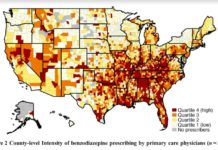Benzodiazepine Prescriptions in Older Adults Used in Rural and Low Income Areas
Benzodiazepine prescription practices may be in response to an epidemic of distress, rather than being used to treat specific mental health diagnoses.
Individuals With Low Incomes More Likely to Have Chronic Pain
Findings show that participants with lower levels of education and SES suffer from more chronic pain.
Study Finds Long-Term Opioid Use Increases Depression Risk
A study published this week in the Annals of Family Medicine reveals that opioid painkillers, when used long-term, can lead to the onset of depression. The researchers found that the link was independent of the contribution of pain to depression.
The FDA’s Latest Black Box Warning: Don’t Mix Opioids, Benzos
The U.S. Food and Drug Administration yesterday mandated updated labels for nearly 400 opioids and benzodiazepines, following a review of scientific evidence and a citizen...
Importance of Physical Symptoms in Mental Health Evals
Researchers at Harvard Medical School highlight the need for mental health clinicians to explore the meaning of physical symptoms and pain
Researchers Find Bias in Industry-Funded Continuing Medical Education
Industry-funded continuing medical education (CME) influences physicians to prescribe more opioids, focus less on the consequences.
Should Our Tax Dollars Be Spent on Promoting Drugs?
As part of the Affordable Care Act, the federal government has made a commitment to integrate behavioral health with physical medicine. Physicians have saddled America with addiction to antidepressants, antipsychotics, and benzodiazpines. If the federal government decides that opiate addiction is ok, as they seem to have conceded, shouldn’t the question be “what is the cheapest and the safest opiate?” In Europe, heroin is an option right along with buprenorphine and methadone. It seems to me that the “back-door” legalization of opiates under the guise of “treatment” ought to at least be debated out in the open.
CBT and Educational Intervention Reduce Chronic Pain, Study Finds
Research examines the effects of cognitive behavioral therapy (CBT) on experiences of chronic pain among low-income patients.
Companies That Fueled the Opioid Epidemic Should Fund Efforts to End It
The quickest way to restore safe use of opioid prescription is to insist that the drug companies that promoted the overuse of opioids now create a pot of money to develop powerful TV, radio, and print ads, free continuing education offerings, and drug rehabilitation research.
Rates of Opioid Use Remain High Among US Adolescents
Researchers investigate trends in opioid use, prescriptions, misuse, and access reported by adolescents and young adults.
Taking Placebos Knowingly Helps in the Reduction of Chronic Back Pain
A new study finds that individuals being treated with open-label placebos showed significant reductions in pain and disability, even when compared to individuals receiving treatment as usual.
Many Physicians Don’t Understand Key Facts about Prescription Opioid Addictions
A Johns Hopkins Bloomberg School of Public Health survey of 1000 US primary care physicians found that many do not understand basic medical facts about the addictive nature of the opioids they are prescribing.
Despite “Flurry of Interest,” Ketamine Remains Unproven For Depression
In 2014, then National Institute of Mental Health (NIMH) director, Thomas Insel, speculated that ketamine “might be the most important breakthrough in antidepressant treatment in decades.” A recent review of the research suggests that while ketamine may produce a rapid short-term improvement in depression, the effect is short-lived and the potential for addiction and dependence warrants considerable caution.
Opioids May Cause Depression and Worsen Chronic Pain
“Converging lines of evidence now suggest that depression—a common comorbidity in the setting of chronic pain—may in some patients represent an unrecognized yet potentially reversible harm of opioid therapy.”
British Medical Association Takes On Prescription Drug Dependence
Last year the British Medical Association (BMA) released a report on dependence and withdrawal from prescription drugs including benzodiazepines, z-drugs, opioids, and antidepressants. Now,...
Intensive Care Patients at High Risk for PTSD, Psychiatric Symptoms
People who survive life-threatening illnesses in the intensive care unit (ICU) of a hospital are at high risk for depression and anxiety and nearly...
CDC Advises Nonopioid Treatments for Chronic Pain
Primary care clinicians and mental health providers face a particular set of challenges when treating individuals with chronic pain. These problems are compounded by...
The Inaugural “Shkreli Awards!”
This piece for the Lown Institute lists 10 of the most egregious examples of profit-mongering and lack of empathy in healthcare in 2017. These examples include...
Research Finds Ketamine Does Not Reduce Delirium or Pain After Surgery
Contrary to widely-held belief, a new rigorous trial finds that ketamine is ineffective for delirium and pain associated with surgery, and the drug carries harmful side effects.
“FDA to Require Much Stronger Warnings on Opioid Painkillers”
NBC News reports that the FDA is taking action in an attempt to make opioid drugs, cousins to opium and heroin, a last-ditch option...
Veterans Often Being Given Risky Combinations of Opioids and Psychotropics
The vast majority of veterans who are taking opioids for pain are also being prescribed one or more psychiatric medications.
America’s Opioid Crisis Proves the Limits of Capitalism
In this piece for RT, Slavoj Žižek discusses the impact of capitalism on America's opioid crisis, exploring the factors that have driven people to use drugs...
Opioid Use in Pregnancy Dangerous and Understudied
Nora Volkow, the director of the National Institute on Drug Abuse (NIDA), authored an editorial for BMJ this month warning that the opioid abuse epidemic could have dangerous consequences for pregnant women. While the effects of opioid exposure on the developing brain are yet unknown, research suggests that infants may suffer from withdrawal syndrome, nervous system defects, and impaired attachment with the mother.
Abilify: The Drug That Could Gamble Your Life Away
On this episode of America's Lawyer, Mike Papantonio discusses the numerous lawsuits pending involving the anti-psychotic drug Abilify, which has caused plaintiffs to develop serious...
Can Education Level Predict Prescription Drug Misuse in Young Adults?
A new study examines the extent to which patterns in prescription drug misuse and substance use disorder symptoms can be predicted by education level
























